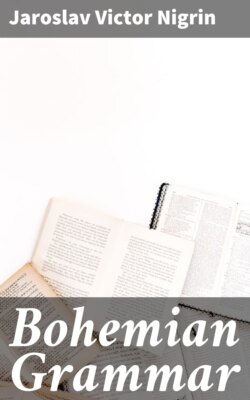Читать книгу Bohemian Grammar - Jaroslav Victor Nigrin - Страница 5
На сайте Литреса книга снята с продажи.
A BRIEF OUTLINE OF THE SLAVONIC LANGUAGES.
ОглавлениеTable of Contents
OLD SLAVONIC, also called Church Slavonic, was originally spoken in the vicinity of Saloniki, and was the first literary language of the Slavs. The old Bulgarian language is the one most closely related to it. Its structure and vocabulary are used as a basis for comparative philology.
BOHEMIAN (Czech) and SLOVAK have been treated in detail in the foregoing pages.
BULGARIAN is spoken by a race of Ugro-Finnish origin, which emigrated from Northern Russia to the Balkans and adopted the language of the Slav tribes whom it conquered. Its main characteristic is the use of definite article at the end of nouns, cf. car-at, zemja-ta, nebe-to. Its older literature contains many fine examples of Slav poesy. (There are three principal dialects spoken in Bulgaria: the Danubian, the Thracian and the Macedonian, which form the bridge between the Russian on the one side and the Serbo-Croatian on the other.)
SERBO-CROATIAN is spoken in Serbia, Croatia-Slavonia, Montenegro, Bosnia and Herzegovina, Dalmatia, Adriatic islands and Southern Hungary (Bacska, Sirmia and Banat). (There are four principal dialects: čakavština, štokavština, kajkavština and cvrližština.) The only difference between the Serbs and the Croats is that the former are chiefly Orthodox and partly Mohammedan and use the Russian alphabet, while the latter are mostly Roman-Catholics and use the Latin alphabet. The greatest literary treasure of this language constitute the national epics (narodne pjesme), in which the national heroes, who fell in the fateful battle of Kosovo Polje. The chief characteristic of this language is that it is spelt entirely phonetically.
SLOVENE is spoken in Southern Styria, Carinthia, Carniola, Istria, Gorizia, Trieste and in several districts near Udine in Italy. It is very much akin to the Serbo-Croatian and shows but slight differences in syntax and composition.
WEND or LUSATIAN SERBIAN is spoken in some districts of the Upper and Lower Lusatia and forms a bridge between the Bohemian and Polish. The center of this tribe, now entirely surrounded by the Germans, is the town of Bautzen (Budyšín).
POLISH is next to Slovak the most akin to Bohemian. Various sounds, which in Bohemian are rendered by diacritical marks, such as š, ř, č, are represented by sz, rz, cz in Polish. A difference is also made between the soft and hard l, as in Russian. The language has also preserved the old Slavonic nasal sounds ą (on) and ę (en). A glorious national history and splendid literature are the heritage of the Polish nation, and the language is well worth the study.
The KASHUBE is a dialect spoken in Pomerania, near Danzig, by about 200.000 souls. The Kashubes, however, mostly consider themselves Poles.
LITTLE RUSSIAN, also called Ruthenian or Ukrainian, is spoken in Eastern Galicia, in the Carpathians from Uzhorod to Munkács, Northern Bukowina, and Southern Russia, along the Black Sea and the rivers Dniester, Dnieper and Don. It is rich in national poesy, and, like the Serbo-Croatian, has preserved some of the purest characteristics of the Slav race. It constitutes a bridge between the Polish and the Russian, being to a certain extent a mixture of the two languages. It chiefly differs from the Russian in the pronunciation of jery, jať, e, o, and u, cf. dilo (Russ. djelo), buv (Russ. byl), dovg (Russ. dolg), ridny (Russ. rodnoj), vže (Russ. uže), usjaki (Russ. vsjaki).
RUSSIAN, also called Great Russian, is the official language of the Russian Empire. It is the most important of all the Slavonic languages and every Bohemian ought to learn it, especially in view of the great facility with which he can acquire it as compared with non-Slavonic nationalities. By learning it one acquires at the same time the key to all other Slavonic languages, so that one can learn any one of them in less than six months.
The grammatical forms and syntax in Russian are purer and more elaborate than in any other Slavonic tongue. The knowledge of Russian opens one the door to an immense literature, whose beauties have thus far found only a very fragmentary interpretation in America. Bohemians in America ought to devote special attention to the learning of Russian language and affairs, because Russia has a great future before her, and the friendliest relations should be cultivated between her and the United States.
Among the extinct Slavonic languages a special mention deserves the Polabian, which was spoken by the Slav tribes who lived on the river Elbe, i. e. Vagri in Lauenburg and Holstein, Bodrici in Mecklenburg, and Lutici (Veleti) in Brandenburg, as far back as the latter part of the 18th century.
